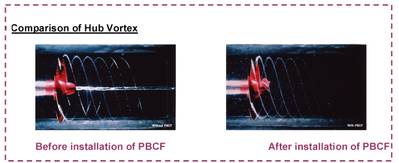Energy-Saving Propeller Boss Cap Fins System
Mitsui O.S.K. Lines, Ltd. (MOL; President: Koichi Muto) and MOL Techno-Trade, Ltd. (MOL Tech; President: Hidehiro Harada) today announced that the energy-saving Propeller Boss Cap Fins (PBCF), developed by MOL, West Japan Fluid Engineering Laboratory Co., Ltd., and Mikado Japan, Ltd., and sold by MOL Tech, has now been ordered for 2,000 vessels worldwide.
The PBCF is an energy-saving device attached to the propellers of a vessel. It breaks up the hub vortex generated behind the rotating propeller, resulting in a decrease of more than 9,000 tons of CO2 emissions per year due to a 3-5% reduction in fuel consumption by a large-scale containership.
Research and development on the PBCF started in 1986, and sales began the following year. Since then an increasing number of shipowners, mainly in Japan, began to adopt the system. By 2006, the 19th year since the start of sales, the PBCF had been ordered for 1,000 vessels. Since then, it has gained worldwide recognition by vessel owners and operators, and the number of ships adopting it has doubled in just five years, reaching the 2,000 vessel milestone this year.
At the Second International Symposium on Marine Propulsors in Hamburg, Germany, in June 2011, BMT Defence Services Ltd. of U.K. presented a paper reporting on a before and after speed test using an Aframax tanker operated by a major firm, showing nearly 4% energy saving effect. This independent study once again brought the PBCF to the attention of the shipping industry and the public.
The MOL Group is promoting its next-generation vessel concept called Sempaku ISHIN, and the PBCF is one of its key technologies. Mandatory energy efficiency measures for international shipping were adopted at the International Maritime Organization (IMO) IMO environment meeting on July 15, 2011, and regulations on greenhouse gas emissions by the ocean shipping will make the PBCF even more valuable in the future. The MOL Group continues its research and development on various green technologies and promotes global environmental protection by helping reduce CO2 emissions from vessels.







